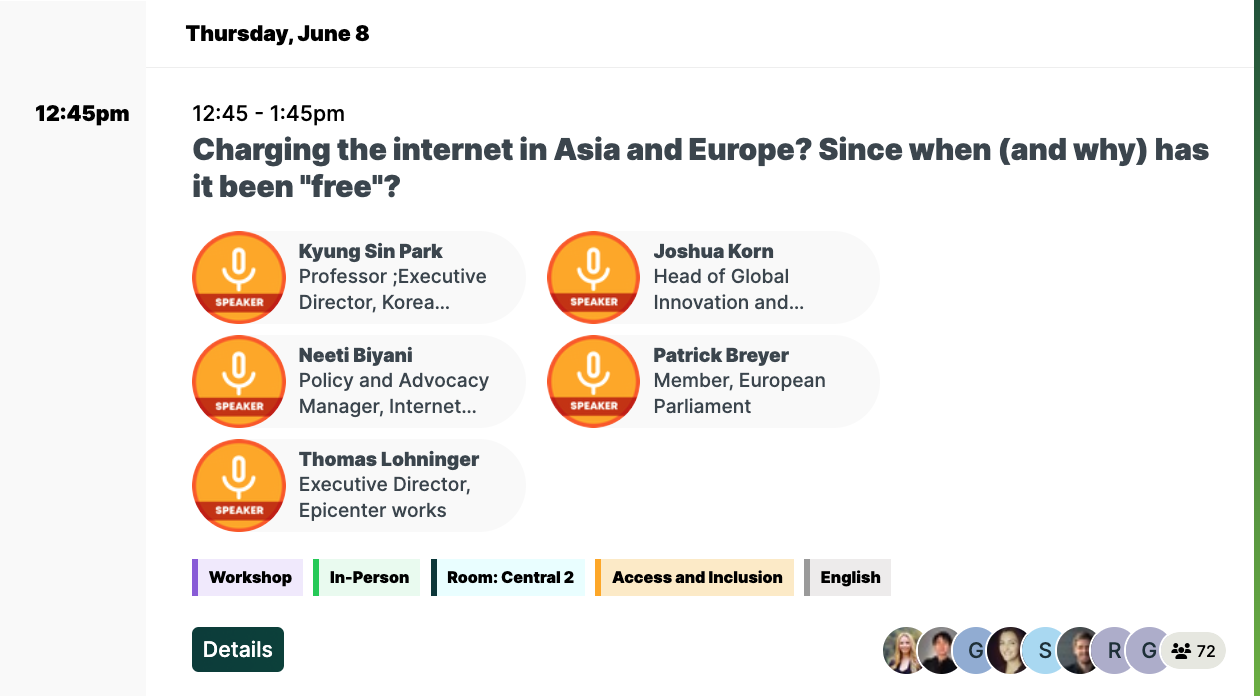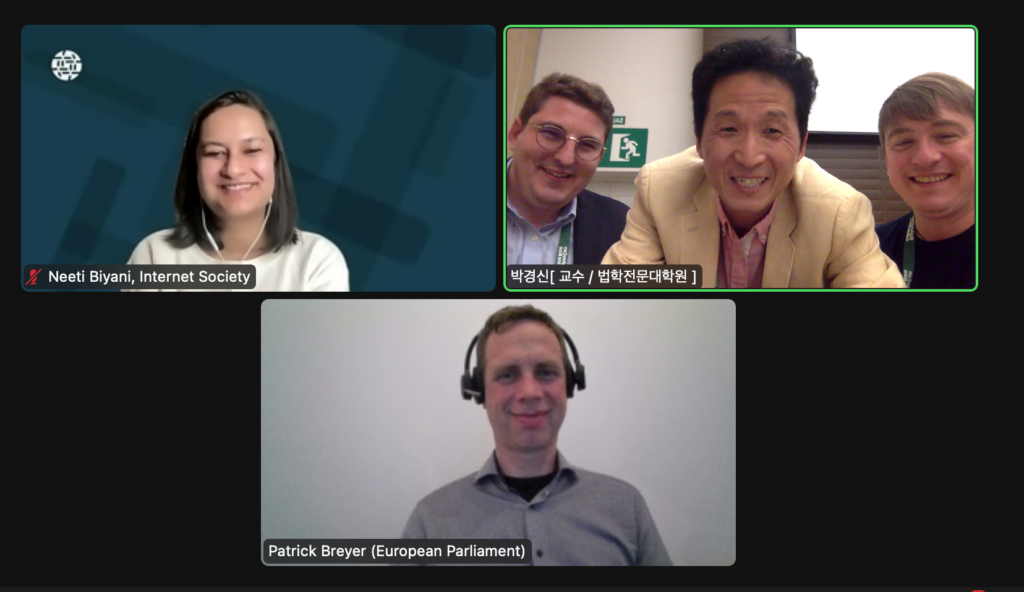Open Net held a Rightscon session to discuss the recent proposals in Asia and Europe to mandate content providers to pay “network use” fees to local eyeball telcos on June 8, 2023. Open Net believes that such initiative in its mandatory form will operate as taxation on exercise of freedom of speech and will restrict people’s ability to organize among themselves and share information, and therefore suppress the internet’s role in facilitating democracy movements and other civic discourses. Here are the main discussions from the session.


[Photo in the right upper corner: Joshua Korn, Head of Global Innovation, Technology, and Public Policy, Netflix; K.S. Park, Director of Open Net, the host organization; Thomas Lohninger, Executive Director, epicenter.works, from left to right]
The internet has been a great liberator and equalizer by giving powerless individuals the same tools of mass communication and information as big businesses and governments. Such freedom was made financially possible by the customary rule that network operators do not charge for data delivery to their customers. Such rule was based on the scientific fact that electromagnetic signals going through medium expend hardly any energy and the promise that all routers will pass the data packets they receive to the next routers one notch closer to the announced destinations of the packets, regardless to whom packets belong to. This great crowdsourcing, this opening of everyone’s network resources to everyone else, for free is what we now call IP on TCP/IP. As a result, All users, individual or corporate, were in principle charged only the cost of maintaining physical connection to their neighbors, and this allowed people to communicate at scales unimaginable in the era of postage and telephone era. This removal of the “gatekeepers” or “toll chargers” is what enabled the civilizational significance of the internet, contributing to democracy and economic opportunity. The customary rule was later codified into net neutrality, a norm that all data packets should be treated in delivery equally regardless of content, origin, or payment. Data cannot delivered or not delivered, or prioritized or not prioritized for payment. Of course, the exception remains that the entities connecting to one another can choose to configure their connection payments in the ways they like. Indeed, there has been a voluntary practice of charging “peering fees” whereby network operators paid money to other entities incentives to connect. Netflix paid Comcast once to make short-cut connection, Google paid Orange once to directly connect. All good. It was completely voluntary: it the entities could not agree to the conditions of connection, for a fee or not, they simply routed the traffic other ways.
Now, what we want to talk about today is that some governments trying to make such payment mandatory for the senders of huge amounts of data such as Google, Facebook, and Netflix, for the reason that they should contribute to maintaining the network infrastructure. In Korea, such rule was even adopted with the added requirement that the payment be proportional to the volume of the data sent, which had the effect of aborting the traditional practice of not charging for data delivery. In Indonesia, back in 2021, the attempt was made to make it mandatory for all content providers to enter into “partnership” with local telcos. Now, in Viet Nam, we are very close to seeing such law. In Nepal, Taiwan, and India, the telcos are lobbying to the governments to pass such law.
Whether such new rule mandating the peering fee (proportional to data volume or not) is beneficial or harmful for the internet eco-system is in intense debates in Korea, Europe, and other countries.
Having said that, there are a couple of new empirical facts that we must work with. The rule of mandating sender pays has the effect of reducing competition among ISPs, the competition to host popular content providers. Normally, they compete to host them so that their contents can be delivered to their own customers without going thru too many routers. But as hosting popular contents means sending more data to other ISPs and therefore means having to pay other ISPs, this has the effects of disincentivizing ISPs from hosting popular contents and therefore increasing the internet access fees that the telcos charge content providers.
The other piece is confirmation by the governments of the Netherlands and Germany that the traffic-sensitive component of network maintenance cost is minuscule, and therefore the narrative that big techs take up certain large proportions of data traffic do not justify charging them for “network usage”, the fee that did not exist.
All in all, the focus is not on whether paid peering is allowed but whether paid peering should be mandated. Also, what does it mean to mandate when the two parties connecting with each other have complete freedom to disconnect? If the fee mandated is too large, content providers can always disconnect with the direction connection with the local telcos and rely on the Tier 1 ISPs to deliver to them, eliminating the possibility to be required payment.
Open Net is currently working with local stakeholders in Asian countries to push back against the legislative initiatives but the bigger wave will be coming from Europe.
Mr. Breton is really wreaking a lot of principles and traditions in this effort to bring more benefits to the telecom sector. Europe has its rules on how Europe makes laws. For example, there is supposed to be an impact assessment so that you scientifically evaluate the consequences of the law that you have assessed the potential damages, and checked whether there are enough safeguards in the legislation. But this has not been done. This has led to a lot of criticism not just from civil society and consumer protection groups.
There could be a real danger that we see this idea spreading. Europe is not the only place where the network usage fee debate is happening loudly. We have consultations with the Brazilian and the Indian telecom regulator on the same issue. The cost of connecting networks of bringing the internet together is just like the cost of the cable the cost of the capacity. It’s not a way to make money. And honestly, even with or without this becoming law we already have the problem that a few very big telecom operators like dutch telecom already demand payments for making services accessible in the network. And in my opinion and also in my legal opinion that is a net neutrality violation that should be on the top of our agenda once we’ve concluded that debate.
It is a fact that the Internet was built by interconnections among 75,000 independent networks. It’s not content providers who are responsible for creating additional traffic. It is ultimately users who are requesting this traffic. And therefore the framing of large quantum providers causing increased traffic is fundamentally incorrect because it is people like you and me who are driving the traffic who are requesting this traffic. As we all know the internet’s been evolving consistently and therefore the interconnection market has grown to accommodate the user experience. From the point of view of the open global internet, I think we need to understand that this infrastructure that everyone is involved in whether it’s content delivery networks, cloud providers, community networks, satellite networks, data centers, or just content cash right everybody is building this infrastructure because everybody is involved and everybody is spending money and everybody’s benefiting. So this money that is being spent to ensure that the internet is more efficient and more resilient makes it paramount for us then to recognize the plurality of internet infrastructure rather than introducing regulations to restrict it, reduce innovation or threats to get neutral care will get into it. But the one thing to definitely realize is that the increased costs as a result of you know, cost-sharing proposals if they do go through these increased costs are going to come down to customers. They’re going to come down to us because we will be charged higher prices for availing the same internet services that we’re paying for right now.
It forgets that one of the core tenets of net neutrality principles is that demand generates a need for internet and that need is connectivity. Whether it be connectivity to each other whether it be connectivity to news, whether it be connectivity to civil discourse and participation in government, or whether it would be to watch a really good reality tv show on a streaming service whatever whatever that need may be that that demand generates that growth and that investment for more connectivity.
The reason that Netflix ended up paying Comcast was that there was no connection to Comcast that didn’t have some charge applied to it for traffic. So ultimately the cheapest path into Comcast was paying them directly.
And the telecommunication companies know that and they are able to create congestion on those interconnection points to force the charge. And so as you kind of think about how this ultimately affects users it’s the manufacturing of congestion that ultimately leads to the need to pay. And so if you have the ability to pay or a requirement to pay then the only way to force someone to pay is to create congestion to limit that access to speech, that access to information that will ultimately enable kind of connectivity the use of connectivity to that that we’re talking about.
For consumers that ultimately means less choice that ultimately means less access ultimately means they’re just not getting what they’re paying for and there’s this harm that comes from it. And we’ll end up with what looks like a cableization of the internet where you’ll have outages where you’ll have retransmission fee disputes where you won’t be able to access all the traffic coming via this transit provider or this content delivery network. The internet is really this kind of interconnected network that without free flow just stops every.


0 Comments